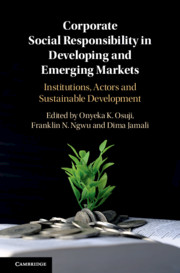 Corporate Social Responsibility in Developing and Emerging Markets
Corporate Social Responsibility in Developing and Emerging Markets from Part I - Institutions, CSR Conceptualizations and Sustainable Development
Published online by Cambridge University Press: 18 December 2019
The chapter draws insights from the institutional theoretic model to investigate the role of courts and other formal adjudicative institutions in promoting sustainable development. Its tripartite institutions framework emphasises the knowledge and communicative elements of sustainable development flowing from key social actors such as adjudicative institutions to other segments of society. Using environmental protection as a case study and making references to national laws and judicial decisions, the chapter demonstrates that adjudicative institutions can manifest a commitment to sustainable development, affirm applicable global standards influence other actors in, and segments of, society. It is argued that the regulatory role of adjudicative institutions includes constitutionalisation of sustainable development, empowerment of individuals and stakeholder groups and addressing vulnerability of victims while the normative role ensures the internalisation and transmission of sustainable development values. The cognitive role includes reshaping local practices by promoting effective glocalisation and appropriate corporate governance and social responsibility for sustainable development. While it shows adjudicative institutions as a key champion for sustainable development in the public and private spheres, the chapter proposes solutions to overcoming impediments to such as lack of explicit provisions, narrowly focusing on compensatory remedies, locus standi, forum non conveniens and choice of law.
To save this book to your Kindle, first ensure no-reply@cambridge.org is added to your Approved Personal Document E-mail List under your Personal Document Settings on the Manage Your Content and Devices page of your Amazon account. Then enter the ‘name’ part of your Kindle email address below. Find out more about saving to your Kindle.
Note you can select to save to either the @free.kindle.com or @kindle.com variations. ‘@free.kindle.com’ emails are free but can only be saved to your device when it is connected to wi-fi. ‘@kindle.com’ emails can be delivered even when you are not connected to wi-fi, but note that service fees apply.
Find out more about the Kindle Personal Document Service.
To save content items to your account, please confirm that you agree to abide by our usage policies. If this is the first time you use this feature, you will be asked to authorise Cambridge Core to connect with your account. Find out more about saving content to Dropbox.
To save content items to your account, please confirm that you agree to abide by our usage policies. If this is the first time you use this feature, you will be asked to authorise Cambridge Core to connect with your account. Find out more about saving content to Google Drive.